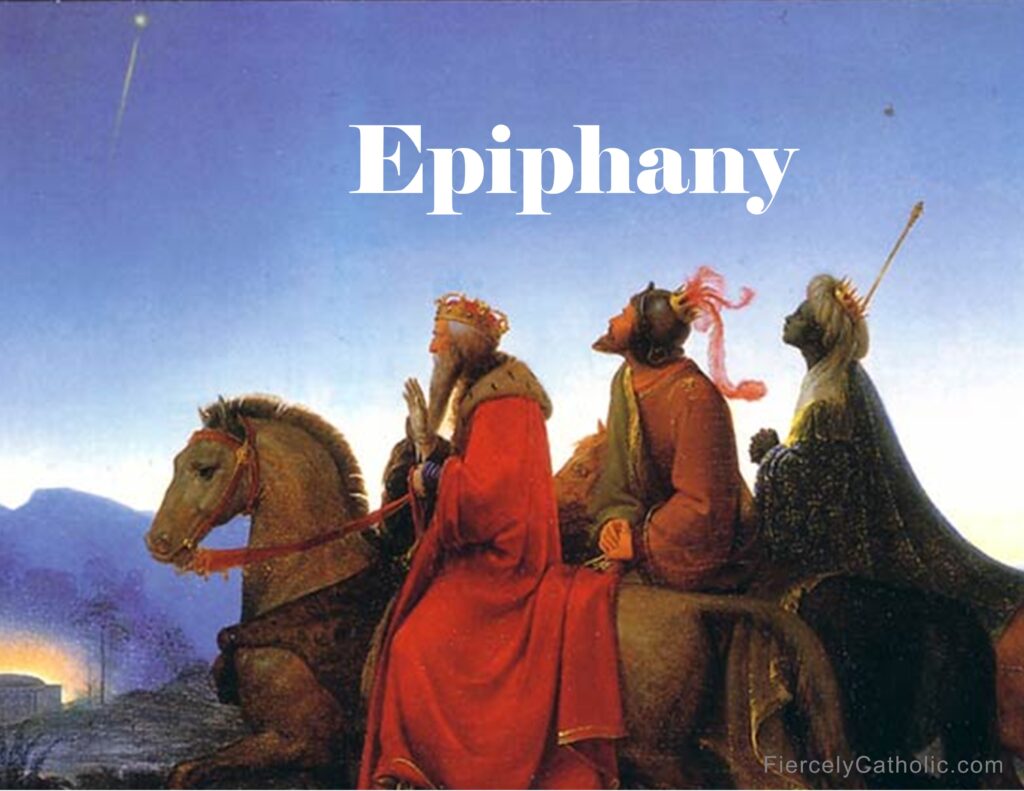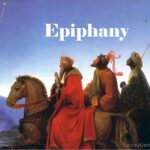
Recalling the event when wise men from the East visited the child Jesus and brought Him gifts, the Epiphany, or Manifestation of Christ, has been celebrated since earliest days of the Church.
The gifts of gold, frankincense, and myrrh that were brought for Jesus were prophesied in the Old Testament. These gifts also indicate Jesus’ roles as King, Priest, and Savior.
Sometimes referred to as kings or astrologers, these Magi had seen a new star in the East which they understood to signify the birth of a new king.
Representing the Gentile nations, these men show that Jesus did not come for a single nation or tribe but came for the whole world, hinting at Jesus’ great commission to baptize and make disciples of all nations.
The Bible does not provide their names but traditionally the wise men are called Balthazar, Gaspar, and Melchior. They are venerated as saints.
The Feast of the Epiphany has been traditionally celebrated on January 6 but is transferred to the first Sunday after January 1 in the United States.
Emphasizing that Jesus is God and that He came to die:
What really matters about the Epiphany:
They were overjoyed at seeing the star, and on entering the house they saw the child with Mary his mother. They prostrated themselves and did Him homage. Then they opened their treasures and offered Him gifts of gold, frankincense, and myrrh.
Matthew 2: 10-11
The Wise Men were looking for more:
Manifested to the whole world:
The Magi represent those who have ever searched for the truth:
The Magi prostrated themselves:
The Epiphany is the manifestation of Jesus as Messiah of Israel, Son of God and Savior of the world. The great feast of Epiphany celebrates the adoration of Jesus by the wise men (magi) from the East, together with his Baptism in the Jordan and the wedding feast at Cana in Galilee. In the magi, representatives of the neighboring pagan religions, the Gospel sees the first-fruits of the nations, who welcome the good news of salvation through the Incarnation. The magi’s coming to Jerusalem in order to pay homage to the King of the Jews shows that they seek in Israel, in the messianic light of the star of David, the One who will be king of the nations. Their coming means that pagans can discover Jesus and worship Him as Son of God and Savior of the world only by turning towards the Jews and receiving from them the messianic promise as contained in the Old Testament. The Epiphany shows that “the full number of the nations” now takes its “place in the family of the patriarchs”, and acquires Israelitica dignitas (is made “worthy of the heritage of Israel”).
Catechism of the Catholic Church 528
God wants to reveal Himself to the whole world:
Jews and non-Jews were waiting for a king:
The Magi point toward the Church’s mission:
The journey of these men is just the beginning. Before them came the shepherds – simple souls, who dwelt closer to the God who became a child, and could more easily “go over” to Him and recognize Him as Lord. But now the wise of this world are also coming. Great and small, kings and slaves, men of all cultures and all peoples are coming. The men from the East are the first, followed by many more throughout the centuries. After the great vision of Isaiah, the reading from the Letter to the Ephesians expresses the same idea in sober and simple terms: the Gentiles share the same heritage. Psalm 2 puts it like this: “I shall bequeath you the nations, put the ends of the earth in your possession”
Pope Benedict XVI, Homily, January 6, 2012
Celebrating the Epiphany in Bethlehem:
The Truth, Goodness, and Beauty of the Catholic Church
God has done something:
Share this page with friends and family to start a conversation about your faith.
Don’t miss a post. Learn more about the Catholic Church and strengthen your Catholic faith.
Find more Fiercely Catholic video issues here.
Subscribe here.


